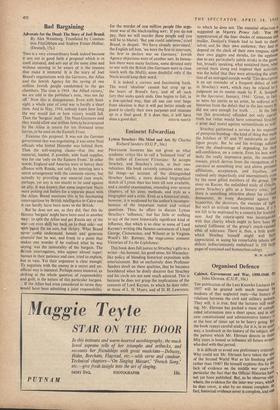Eminent Edwardian
Lytton Strachey: His Mind and Art. By Charles Richard Sanders. (0.11.P., 36s.)
PROFESSOR SANDERS has not given us what academic critics like to call a 'balanced view' of the author of Eminent Victorians: he accepts Strachey, and Strachey's circle, at their own valuation. His book certainly contains some use- ful things—an account of the distinguished Strachey family, a more detailed biographical sketch of Lytton than has been till now available, and a careful examination, extending over several chapters, of his aims, methods, and style as a biographer and a critic. Even as a historical study, however, it is weakened by the author's incompre- hension of the important moral and critical questions. Thus, he offers to discuss Lytton Strachey's 'influence,' but' has little or nothing to .say of the most historically significant kind of influence, that which is so clear in some of Lord Keynes's writing (the famous caricatures of Lloyd George, Clemenceau, and Wilson) or in Virginia Woolf's Mr. Ramsay, the tragi-comic eminent Victorian of To the Lighthouse.
This book does full justice to Strachey's gifts as a writer—his humour, his good sense, his Macaulay- like policy of blending historical exposition with entertainment. But so exclusively does Professor Sanders dwell on these qualities, that he becomes bewildered when he dimly discerns that Strachey and his circle are not now much admired. This is because he does not grasp the implications of the censures of Lord Keynes, to which he does refer, or those of L. H. Myers, and of D. H. Lawrence,
to which he does not. The essential objection is suggested in Myers's Prince Jali: 'For the appreciation of the finer shades of meanness and malice, Daniyal's friends had to look to them' selves and be their own audience; they had t° depend on the clack of their own tongues, upon their own giggles and shrieks, for the applause due to any particularly subtle stroke in the game; but, broadly speaking, what sustained them, what carried them along and inspired their activities, was the belief that they were attracting the alien' tion of an outraged outside world.'This description is an apt reminder of a frequent defect of tone in Strachey's work, which may be related to judgment on its matter made by F. A. Simpson in the Spectator, January, 1944: 'Great, in fact' as were his merits as an artist, he suffered as historian from the defect that in the last resort he did not care enough for truth. . . . In the 1on8 run [his procedure] offended not only against truth but (what would have concerned StracheY a great deal more) against verisimilitude as well: Strachey performed a service in his exposure of pompous humbug—the kind of thing that mad' the Jubilees of '87 and '97 intolerable to Intel' ligent people. But he and his writings suffered from the disadvantage of depending, for their self-confidence, on a coterie. Even his best work lacks the really impressive poise, the necessary tension, which derives from the recognition of 3 standard as something over and above persona; affiliations, acceptances, and loyalties, and realised only imperfectly and intermittently even by the most gifted members of the group. The essay on Racine, the unfinished study of Othello, prove Strachey's gifts as a literary critic; and, there is something attractive about his civilised demeanour, its irony sharpened against the hypocrites, the deceivers, the enemies of light. But such an attitude soon becomes inane, if it i,5 not felt to be motivated by a concern for truthful' ness. And the coterie-spirit was incompatible with that charity which ought to have been the natural fulfilment of the group's much-vaunted ethic of tolerance. There, is, then, a little iron'', which Strachey himself might well have
, appreciated, in seeing his remarkable talents and defects indiscriminately embalmed in 350 large pages of sustained and humourless eulogy.
w. W. ROBSOr4




























 Previous page
Previous page